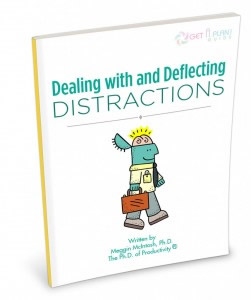Don’t Multi-task by Ann Gomez
 As professors, you are constantly looking for ways to get more done each day. Multi-tasking is such an enticing concept. The allure of doing two things at once can be too much to resist at times. Evidence, however, clearly demonstrates that multi-tasking is not all it’s cracked up to be. If you need more reasons NOT to even attempt to multi-task, take a look at these:
As professors, you are constantly looking for ways to get more done each day. Multi-tasking is such an enticing concept. The allure of doing two things at once can be too much to resist at times. Evidence, however, clearly demonstrates that multi-tasking is not all it’s cracked up to be. If you need more reasons NOT to even attempt to multi-task, take a look at these:
- Multi-tasking leads to more mistakes. Let’s consider email. A lot of people type emails while on the phone which can lead to mistakes: forgetting the attachment, crafting a cryptic message; or sending confidential information to the wrong person. Oops!
- Multi-tasking takes more time. Many studies show that it takes us longer to complete things if we switch back and forth between activities. If you want to test yourself, try this exercise (inspired from Dave Crenshaw’s book: The Myth of Multitasking):
- Time yourself to write out the these two lines:
- 1 2 3 4 5 6 7 8 9 10 11 12
- C l e a r C o n c e p t
- Time yourself to write out the same two lines again. But this time, alternate between the numbers and letters.
I’ve done this exercise with thousands of people and typically, it takes people about twice as long when they are switching (which is akin to multi-tasking).
- Time yourself to write out the these two lines:
- Multi-tasking leads to distractions. When we jump from one task to another, we can get distracted pretty easily. And once we are distracted, it often takes several minutes (or even hours or days) before we return to our original task.
- Multi-tasking can make it easier to procrastinate. Most of us struggle with procrastination in one form or another. If we face something difficult, it can be tempting to ‘jump’ to another task instead of ploughing through the difficult task.
- Our brains are not designed to multi-task. Neurological research demonstrates that our brains line up tasks, performing one after the other. We are not able to process two things at once. We lose time every time we transition from one task to another – and this lost time adds up quickly.
- Multi-tasking is disrespectful. We’ve all been in meetings with someone who starts reading their Blackberry in the middle of our discussion. And it’s pretty easy to tell when someone is giving us their ’email voice’ on the phone.
- Multi-tasking leads to more stress. We can all relate to the frustration of being really busy but not getting anything done. One study found that a mere 20 minutes of interruptions led to significantly higher levels of stress, frustration, workload, effort and pressure.
- Multi-tasking hinders creativity. If we are constantly jumping from one thing to the next, we are not allowing enough time to get our creative juices flowing.
- Multi-tasking doesn’t allow us enough time to ramp up. For any task, we need to allow time ramp up to peak productivity. We need to refresh ourselves on the context, think about where we left off and get into the zone of the new task. If we are constantly jumping between tasks, we spend all of our time in ramp up mode and very little time humming along at peak productivity.
- The final nail in the multi-tasking coffin is that it can have a negative impact on our IQ. Yes – you read that correctly! A study commissioned by Hewlett Packard found that the distractions of constant emails, text and phone messages had a bigger (and negative) impact on IQ than did taking cannabis. Yikes!
So there you have it – many reasons not to multi-task. Focusing on one thing at a time is so much more productive.
Stay tuned for the next Top 10 when I talk about ways to manage interruptions (and build more focused work time into each day).
© Ann Gomez BSc, MBA, ann.gomez@clearconceptinc.ca
Work: 905-237-1651 │Cell: 416-209-2221
Sign up for my blog at Clear Concept Inc.
 If you liked these writing tips, you may be interested in the Get a Plan! Guide® for Dealing with and Deflecting Distractions. It’s specially designed so you can accomplish your goals more smoothly (i.e., peacefully, productively, and predictably). You’ll learn ways to take stock of your distractions, along with 6 means to eliminate – or at the very least, minimize – those distractions. I promise that you will have a plan that you can implement starting today.
If you liked these writing tips, you may be interested in the Get a Plan! Guide® for Dealing with and Deflecting Distractions. It’s specially designed so you can accomplish your goals more smoothly (i.e., peacefully, productively, and predictably). You’ll learn ways to take stock of your distractions, along with 6 means to eliminate – or at the very least, minimize – those distractions. I promise that you will have a plan that you can implement starting today.





